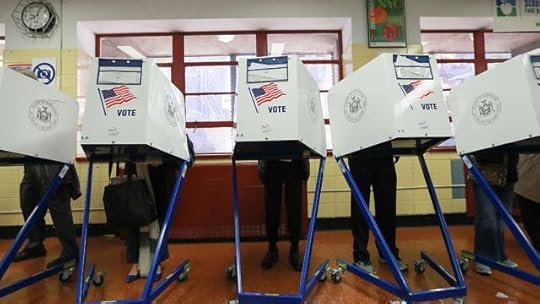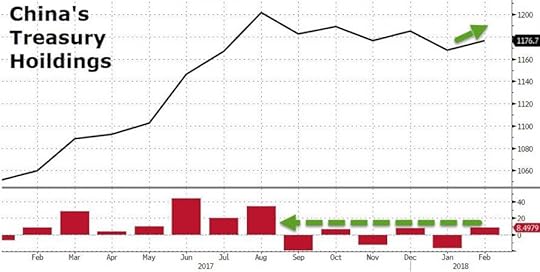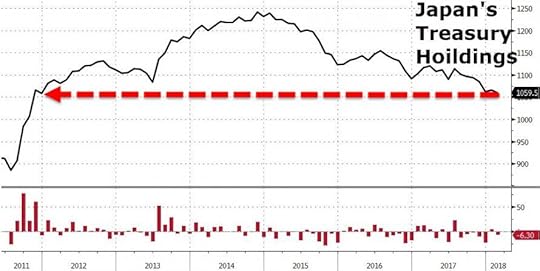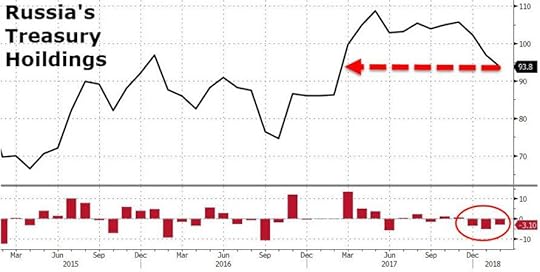Stuart Jeanne Bramhall's Blog: The Most Revolutionary Act , page 1087
April 19, 2018
Boehner’s Marijuana Lobbying Symptomatic of Revolving Door Problem
[image error]
Source: Brian Saady, Blacklisted News
The former Speaker of House, John Boehner, and former Massachusetts Governor, Bill Weld, were added to the Board of Advisors for Acreage Holdings, an investment company heavily involved in the legal cannabis industry.
This pair of former conservative leaders will certainly help to bring bipartisan support for the pro-legalization movement. They’re also part of an emerging trend of conservative revolving door lobbyists working on behalf of the legal marijuana industry.
Last September, the former three-term Republican Senator from New York, Al D’Amato, wrote an op-ed for the Daily News in support of a state medical marijuana bill. It was titled, “My epiphany on medical marijuana: Sen. Al D’Amato explains why he came around on pot policy.” At the end of his piece, there was a disclosure that D’Amato is a “paid senior advisor” for the Marijuana Policy Project of New York.
He wrote a similar op-ed in 2014 in the Long Island Herald not long after signing a $15,000 per month lobbying contract with two cannabis-related companies. The co-founder of one of those companies, Richard Yost, noted that $200,000 was budgeted for the full year. He told Newsday, “It’s a Republican issue in the Senate, and Park Strategies has a strong relationship on that side.”It’s this kind of influence peddling that is ruining our political system.
These men’s views on cannabis may have genuinely shifted over the years, but it’s very convenient (and lucrative) to now be lobbying on behalf of the right side of history. John Boehner recently claimed that his position on marijuana “evolved,” but he had a 0% rating from the pro-marijuana legalization group, NORML, before leaving office. He was also the leading recipient of donations from the tobacco industry, which has aggressively lobbied against marijuana legalization. . .
Source: Boehner’s Marijuana Lobbying is Symptomatic of Special-Interest Problem
April 18, 2018
Russia Threatens To Halt Critical Rocket Engine Exports To The U.S.
Oops – maybe bombing Damascus wasn’t such a good idea after all.
Despite earlier reported hopes that Putin seeks a deal with Trump, as opposed to escalating tensions, it appears Russia is planniong to do just that.
Last Friday (the 13th), just before the US, UK and France launched 105 Tomahawk missiles at Syria, we noted that as part of Russian countermeasures against US sanctions, it could halt titanium exports to the US, critical for the production of Boeing airplanes, which promptly sent Boeing’s stock lower.
As it turns out Russia has leverage not only over the biggest US exporter of airplanes and military equipment: what piqued our interest, is the United States Department of Defense (DoD) dependency on Russian-manufactured rocket engines to launch military satellites into low Earth orbit (LEO).
Pentagon officials have previously stated their space programs will not migrate to American-built rocket engines until at least 2024, with some analysts forecasting the reliance on Russian-made parts through 2028…
View original post 468 more words
North and South Korea Reportedly Set to Announce Official End to War
Pyongyang and Seoul have technically been at war since the 1950-1953 Korean conflict ended with a truce — and not a peace treaty.

Ahead of a summit next week between North Korean premier Kim Jong Un and South Korean President Moon Jae-In, lawmakers from the neighboring states were thought to be negotiating the details of a joint statement that could outline an end to the military conflict between the two countries.
Pyongyang and Seoul have technically been at war since the 1950-1953 Korean conflict ended with a truce — and not a peace treaty.
By Sam Meredith
April 17, 2018 “Information Clearing House” – North and South Korea are in talks to announce a permanent end to the officially declared military conflict between the two countries, daily newspaper Munhwa Ilbo reported Tuesday, citing an unnamed South Korean official.
Ahead of a summit next week between North Korean premier Kim Jong Un and South Korean President Moon Jae-in, lawmakers from the neighboring states were thought to be negotiating the details of a…
View original post 164 more words
How Arrogance Blinds the West to Their Historic Decline
Peter Frankopan – The Silk Roads
Directed by Justin Hardy (2017)
Film Review
This documentary, based on historian Peter Frankopan’s best selling book Silk Roads, explores the Western trait of putting their own interests at the center of their world and possessing no interest or capacity to understand other cultures.
Typically both Europeans and Americans believe they have a monopoly on “goodness” – that only they can save the world from darkness and suffering. Their ruling elite uses these beliefs to justify invading and occupying third world countries and are surprised when other cultures regard us as smug and arrogant.
According to Frankopan, Europe and the US presently find themselves at the wrong end of global trade routes. Asian countries, especially China, that used to be poor are rich now. Asia provides the vast majority of Western consumer goods and owns most Western debt. Over the last 40 years, there has been a vast transfer of wealth from the West to Asia. These new centers of wealth (especially China) have become the hub of scientific, technological and intellectual progress. However owing to their self-centered navel gazing, most Westerners are totally unaware this is happening.
Frankopan also maintains Europe has never had much to offer in the way of natural resources or intellectual innovation (Christianity has always suppressed knowledge and progress). In 800 AD, Mesopotamia was the wealthiest region in the world, with Baghdad viewed as the global center of trade and learning. During this period, Europe’s most important resource was slaves, with Dublin, Mainz, Utrecht and Venice serving as major trafficking centers for kidnapped women and children.
All this changed with the conquest of the New World, the enslavement of Native Americans and Africans, and the flow of silver and gold back to Europe. This illicit capture of mineral wealth and human beings enabled Europe to developed highly specialized skills in violence and conquest. They no longer needed to produce their own wealth because they could use their military prowess to steal it from other regions.
Over time, the economic decline of the West has eroded their military capability to the point they can no longer win wars.
As in Rome, obscene income inequality is one of the main indicators of an empire in decline.
April 17, 2018
How the US is Illegally Occupying 30% of Syria Containing Most of Its Oil, Water and Gas

By Whitney Webb
Global Research, April 17, 2018
MintPress News 16 April 2018
After the U.S. launched “limited” airstrikes on Friday April 14, 2018, against Syria, U.S. Ambassador to the United Nations Nikki Haley announced that the U.S. will maintain its illegal presence in Syria until U.S. goals in the area are fulfilled, opening the door for the U.S. occupation to continue indefinitely.
While the U.S. military presence in Syria has been ongoing since 2015 – justified as a means of countering Daesh (ISIS) — U.S. troops have since turned into an occupying force with their failure to pull out following Daesh’s defeat in northeastern Syria. Currently, the U.S. occupies nearly a third of Syrian territory — around 30 percent — including much of the area east of the Euphrates River, encompassing large swaths of the Deir Ezzor, Al-Hasakah and Raqqa regions.
Though the U.S. currently has between 2,000 to 4,000 troops stationed in Syria, it announced the training of a 30,000-person-strong “border force” composed of U.S.-allied Kurds and Arabs in the area, which would be used to prevent northeastern Syria from coming under the control of Syria’s legitimate government. Though it backtracked somewhat after backlash from Turkey, the U.S. has continued to train “local forces” in the area. Russian military sources have asserted that former members of Daesh — who were allowed to leave cities attacked by the U.S. and their proxies, as was the case in battle for Raqqa — are to be included among the force’s ranks.
This, along with the U.S. government’s insistence on maintaining the occupation until Syrian President Bashar al-Assad is removed from power, shows that the U.S. government has no intention of permitting the reunification of Syria and will continue to occupy the region over the long term.
The illegal U.S. occupation of Syria has been widely noted in independent and corporate media, but little media attention has focused on identifying the wider implications of this occupation and the U.S.’ main objectives in keeping northeastern Syria from coming under the control of the legitimate, democratically elected Syrian government. As is often the case in U.S. occupations, both historical and present, it is an effort born out of two goals: resource acquisition for U.S. corporations and the destabilization of a government targeted for U.S.-backed regime change.
Control of fossil fuel deposits and flow
Northeastern Syria is an important region owing to its rich natural resources, particularly fossil fuels in the form of natural gas and oil. Indeed, this area contains 95 percent of all Syrian oil and gas potential — including al-Omar, the country’s largest oil field. Prior to the war, these resources produced some 387,000 barrels of oil per day and 7.8 billion cubic meters of natural gas annually, and were of great economic importance to the Syrian government. However, more significantly, nearly all the existing Syrian oil reserves – estimated at around 2.5 billion barrels – are located in the area currently occupied by the U.S. government.
In addition to Syria’s largest oil field, the U.S. and its proxies in northeast Syria also control the Conoco gas plant, the country’s largest. The plant, which can produce nearly 50 million cubic feet of gas per day, was originally built by U.S. oil and gas giant ConocoPhillips, which operated the plant until 2005, after which Bush-era sanctions made it difficult to operate in Syria. Other foreign oil companies, like Shell, also left Syria as a result of the sanctions.
With the U.S. now occupying the area, the oil and gas produced in this region are already benefiting U.S. energy corporations to which Trump and his administration have numerous ties. According to Yeni Şafak, the U.S. along with the Saudis, Egypt, and Kurdish officials held meetings where decisions were made to extract, process and market the fossil fuels harvested in the region, with the Kurds being given a handsome share of the profits. As of 2015, the Kurds were said to be earning in excess of $10 million every month.
Syria’s Kurdistan exports its oil to Iraq’s Kurdistan, with which it conveniently shares a border, and it is then refined and sold to Turkey. Though no corporations are publicly involved, the deal between Syrian and Iraqi Kurds was brokered by unnamed “oil experts” and “oil investors.” The Kurds in Syria and Iraq did not even sign the agreement in person. They were subsequently “informed” of the agreement by the United States and instructed to supervise the operation.
A source in Iraq’s Kurdistan Regional Government (KRG) told NOW News that “with regard to southern Kurdistan, it was a company and not the KRG that signed the deal, and it is [the company] that directly hands over the sums in cash every month.” Given that over 80 foreign companies are involved in the KRG’s oil trade, most of them U.S.-based, we can safely assume that many of the same players have also been involved in developing the oil trade of Syria’s Kurdistan.
Major corporate interests
The Trump administration’s numerous connections to the U.S. oil industry make this alliance clear. Former Secretary of State Rex Tillerson, who was fired in March, was previously the top executive at ExxonMobil, an oil company that unilaterally brokered an oil deal with Iraqi Kurds behind the back of the Iraqi government and has expressed interest in developing Syrian oil interests in the portion of the country currently occupied by the U.S. . .
Source: How the US Has Illegally Occupied 30% of Syria Containing Most of Its Oil, Water and Gas
DC Considers Letting 16-year-olds Vote

© Getty Images
According to The Hill , a council member in Washington, D.C., has introduced legislation that would lower the age to vote in federal and local elections to 16.
D.C. council member Charles Allen (D) last week introduced the legislation, which could allow 16- and 17-year-olds to vote in the 2020 presidential election, WUSA-TV reported.
Allen said he proposed the legislation after seeing the students march last month in Washington, D.C. for the “March for Our Lives” event to protest gun violence and demand new gun laws.
Seven of the 13 members of the D.C. Council are backing the measure, advocates of the proposal told WUSA-TV.
“I think people are getting excited about this, especially with what’s going on in the nation right now in terms of youth leading social change,” said Alisha Chopra, 18, a senior at School Without Walls in Washington, D.C.
“So I think that people are going to be very excited about it and want to get on board.”
Alex Shyer, a 16-year-old sophomore at Woodrow Wilson High School, told the television station teenagers can handle the ability to vote.
“We work, we pay taxes, we care for family members, we can drive, we can do so many other things. So, adding voting onto that isn’t going to be that big of a responsibility. We can handle it,” Shyer said.
Because Washington, D.C., is considered in some cases a state, it can change the voting age for federal elections as well as local elections. . .
Read more: DC Considers Letting 16-year-olds Vote
Amazon warehouse workers pee in bottles to avoid being punished for taking breaks
“For those of us who worked on the top floor, the closest toilets were down four flights of stairs. People just peed in bottles because they lived in fear of being disciplined over ‘idle time’ and losing their jobs just because they needed the loo.”
Amazon founder Jeff Bezos, who also owns the Washington Post, may be the world’s richest person, with a net worth of about $112 billion. But workers in his warehouses are so desperate to keep their jobs that they don’t even take time to use a restroom, but pee in bottles instead.
The UK Times Union reports that author James Bloodworth went undercover at an Amazon warehouse in Staffordshire, UK, for a book on low wages in Britain. He found that the warehouse’s fulfillment workers, who run around Amazon’s cavernous warehouses gathering products for delivery, had a “toilet bottle” system in place because the bathrooms were too few and too far away to get to quickly. Bloodworth told The Sun:
“”For those of us who worked on the top floor, the closest toilets were down four flights of stairs. People just peed in bottles because they…
View original post 573 more words
April 16, 2018
It’s Not China That’s Dumping US Treasuries…
Russia and China also dumping US debt.
Recent fears, warranted or not about the potential for retaliatory liquidation by China of its US Treasury holdings appear to have been exaggerated because according to the latest TIC data released, the trade-war enemy added $8.5 billion in TSYs in February (the most of any nation and the biggest monthly addition in six months)…
But while China, for now – given the lagged data, is still buying, two other notable nations are selling… significantly.
The second largest foreign US creditor, Japan, that has been liquidating in recent months, and in February, Japan sold $6.3 billion in TSYs (the most of any nation in February), bringing its total to $1,059.5BN, the lowest total since the start of 2012.
And along with Japan, Russia dumped Treasuries for the 3rd straight month to the lowest in a year…
Other notable holders were mixed:
The United Kingdom added $7.2BN to $250.5BN
Belgium…
View original post 73 more words
Center Hit in US Attack Produced Cancer Drugs: Medical Head
Western powers claim their missile attacks struck at the heart of Syria’s chemical weapons program but what they destroyed included a scientific research institution producing cancer drugs.
The Pentagon said three chemical weapons facilities, including a research and development center in Damascus’ Barzeh district and two installations near Homs, were hit in the early hours of Saturday.
The Institution for the Development of Pharmaceutical and Chemical Industries, located in the Barzeh neighborhood northeast of the Syrian capital, specialized in producing specific drugs which are direly in short supply amid Western sanctions.
Saeed Saeed, head of the Institution for the Development of Pharmaceutical and Chemical Industries, said the center was previously used by the Organization for the Prohibition of Chemical Weapons (OPCW) but now works on pharmaceutical products.
“Since the Syria crisis broke out, the country has been short of all kinds of medicines due to the sanctions from Western countries. Foreign companies stopped exporting high-quality medicines to Syria, especially anti-cancer medicines. So we have been conducting researches on anti-cancer medicines here, and three cancer drugs have been developed,” he said.
Saeed noted that he could not have stayed at the research center after the strikes if it had contained chemical weapons, as claimed by the US and its allies.
“If there were chemical weapons in the building, we would not be here. My colleagues and I came here at 05:00 this morning. If there were chemical weapons, we would need to wear masks and take other protective measures to be staying here,” he said.
via Center Hit in US Attack Produced Cancer Drugs: Medical Head
The Link Between Vietnam and Nixon’s Recognition of China
A Disrespectful Loyalty, Episode 9
The Vietnam War
Directed by Ken Burn and Lyn Novick
Film Review
Last night Maori TV showed part 9 of the Vietnam War series.
During the period covered (February 1970 – March 1973), Nixon’s sole focus with to withdraw US troops from Vietnam without losing the 1972 election. He knew he would be defeated if Saigon fell. Much of this episode consists of tape recordings of Nixon’s Oval Office conversations with his chief security advisor Henry Kissinger.
Although the filmmakers refer to 1/4 of US GIs using marijuana in Vietnam and 40,000 being addicted to heroin, for some reason they neglect to mention the South Vietnamese army was the main source of these drugs.
They do report on the growing influence of Vietnam Veterans Against the War and play an excerpt of former naval lieutenant John Kerry’s (a VVAW member) compelling testimony before a Senate investigative committee.
1971 also saw the New York Times publican of the Pentagon Papers, leaked by whistleblower Daniel Ellsberg. This Defense Department study, covering 1945-1967, revealed successive US presidents had been continuously lying to the American public regarding their true motives waging war in Vietnam.
Nixon’s paranoia about documents Ellsberg and others might possess about his own lies led him to create “The Plumbers,” a secret team that broke into Ellsberg’s psychiatrist’s office (in the hope of finding material they could use to blackmail him).
Much of this episode focuses on the Paris peace talks, and Nixon’s efforts to force North Vietnam to agree to a favorable peace treaty. To this end, he resumed bombing raid on North Vietnam, which were far more brutal (in terms of civilian casualties) than those Johnson had been condemned for.
I was surprised to learn that Nixon’s recognition of Communist China (after nearly 40 years) was part of a ploy to increase Chinese and Russian pressure on their North Vietnamese allies to sign a peace settlement favorable to the US.
The latter would be signed on January 23,1973, and over the next few weeks the last US troops would leave Vietnam.
As of March 1973, over 58,000 GIs and 2 million Vietnamese had been killed in North Vietnam.
The Most Revolutionary Act
- Stuart Jeanne Bramhall's profile
- 11 followers











